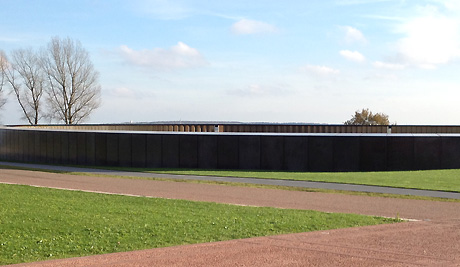12th November 2014 Paris, France
Commemorating 11 November in London and in the North of France

I had the great good fortune to participate in two very different ceremonies to commemorate this 11th of November a hundred years after the start of the First World War.
Written version (continued)
First I accompanied the French Defence Minister, Mr Le Drian, to London where he held talks with the British Defence Minister Mr Fallon, at the Tower of London. And so we were able to visit the extraordinary field of poppies around the Tower. It’s fascinating that this started as the initiative of one sculptor artist and suddenly took off in the public imagination, and has become such a symbol of the 880,000 British soldiers who lost their lives in the First World War.
And as we explained to the French Minister, the sculptor wanted this to be a temporary exhibition, and therefore that the poppies have been sold already for the British Legion, and many of them will now be leaving to those who bought them, some staying for a short period.
The Minister was very interested I think to see that this popular excitment for a mark of respect for all those who died has taken such a significance in the UK.
Secondly I was able to participate in the opening of a new monument built by the French authorities near Arras on the Western front, called a “Ring of memory”. It’s an enormous oval of bronze panels, a bit like the opened pages of a book, with the names inscribed of 580,000 soldiers of all nationalities who died in that area in the North of France.
The special quality of this is that the names are listed in alphabetical order. So the first name on the wall is actually a Nepalese soldier, and the last is a German. And among them are 260,000 names of British soldiers who died, including Wilfred Owen, the famous poet.
Both these monuments in a way capture something about the scale of the losses in the First World War, and also that a hundred years on, it’s no longer a question of nationalities, as in who is on what side, but we should commemorate and honour the memories of all who died, while passing onto new generation the message that absolutely this must never happen again.
Dear Sir Ricketts
Firstly allow me to congratulate you on using the social media. Although early in her role in Belgium I would encourage you to suggest this to the Ambassador based in Brussels as well as other embassies across the world.
In line with service such as IBM used in the USA years ago of keeping their clients informed of the progress in resolving IT problems, the use of regular and interactive feedback by any organisation or government as to the progress on any situation adds to the positive experience.
As a family we are due to travel to the UK on the evening of Wednesday, 3 December returning on Sunday and then travel to our native country, South Africa on the 11th of December. On both occasions to attend close family member’s weddings. However we are without passports as we submitted them for visa applications to the Belgium offices (we are now based in Belgium) to be processed in Paris.
Apart from tracking the process online we have no way of knowing if we would have our passports back in time to travel as planned.
As a forward thinking Ambassador I would urge you to look into this in line with Prime Minister Cameron’s efforts to improve the Visa services as announced at the recent G20 summit in Australia.
Your sincerely
Chris Meyer